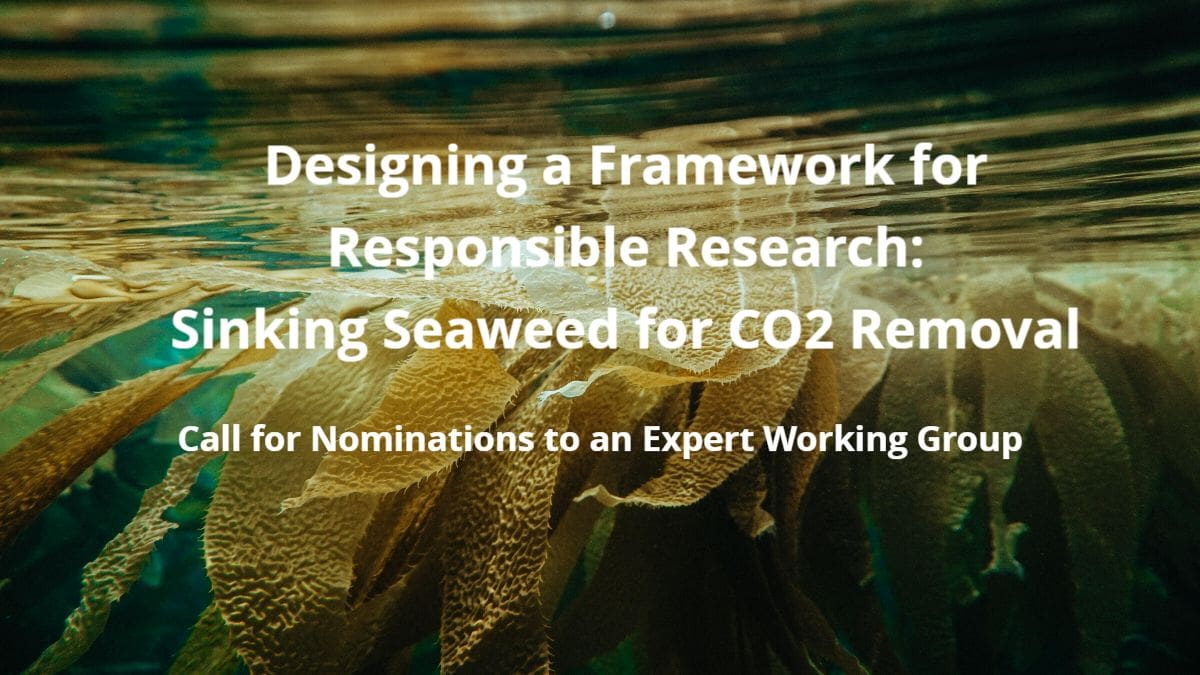
Ocean Visions today opened applications for its “Launchpad” to support competitors to the $100 million XPRIZE Carbon Removal who are pursuing ocean-based carbon dioxide removal (CDR) pathways. The Ocean Visions Launchpad will provide tailored teams of experts drawn from the Ocean Visions Network to assist selected competitors as they compete to win the $100 million XPRIZE Carbon Removal, funded by the Musk Foundation.
Ocean Visions will work with the selected competitors to identify the specific technical and disciplinary expertise, as well as key physical resources (such as testing facilities, vessels, and labs), that they most need to enhance their ability to compete. Ocean Visions will then recruit appropriate experts from within its Network to build customized teams from relevant disciplines and expertise. These advisory teams will provide ongoing technical advice and support over 12-24 months, without charge, to help the selected competitors maximize their chances of winning the prize.
The application process is open to innovators anywhere in the world competing with an ocean-based CDR pathway. Details of the application process and application template can be found here. The application period closes September 24, 2021.
“We’re excited to partner with Ocean Visions to support teams as they compete for XPRIZE Carbon Removal,” says Nikki Batchelor, Prize Director for the XPRIZE Carbon Removal. “Ocean-based carbon removal technologies remain underdeveloped and burgeoning concepts will benefit greatly from the expertise that the Ocean Visions Network can provide.”
This XPRIZE comes at an inflection point for civilization. Severe climate change impacts are arriving much earlier than forecasted and at lower levels of greenhouse gases than predicted by models. Many of the most transformative impacts are in the ocean.
Currently, most global efforts to address climate disruption are focused on reducing current and future emissions of greenhouse gas pollutants. While vital, this path alone is no longer sufficient. The world’s best science clearly spells out the need for gigaton-scale clean-up of the greenhouse gas pollution already in the biosphere[1] in order to avoid the most dangerous effects of climate change, and to ultimately restore our climate.
“We are in a race against time, and time is winning. We need to clean up the massive quantity of legacy carbon pollution that is choking the planet and killing the ocean,” says Brad Ack, Executive Director and Chief Innovation Officer at Ocean Visions. “While we must explore all alternatives, some of the most promising are those that build on natural processes that already occur in the ocean; small increases to the ocean’s total storage could have enormous impacts on remediating climate disruption.”
Through its Network, and in partnership with the Grantham Environmental Trust, Ocean Visions is already fielding similar expert teams to evaluate and advise ocean-based carbon dioxide removal initiatives. The Ocean Visions Launchpad is an expansion of this important work.
About Ocean Visions
Ocean Visions Inc. brings together leading oceanographic research and academic institutions with private sector and public-interest organizations to design and advance solutions to the growing threats to our ocean. We are committed to reversing the climate crisis in the ocean, increasing the resilience of coastal systems and communities to climate impacts, and building a climate-resilient aquatic food system. To learn more, visit www.oceanvisions.org or follow @Ocean_Visions on Twitter.
About XPRIZE
XPRIZE is a global future-positive movement of over 1M people and rising, delivering truly radical breakthroughs for the benefit of humanity. XPRIZE inspires and empowers a global community of problem-solvers to positively impact our world by crowdsourcing solutions through large-scale competitions, tackling the world’s grandest challenges in exploration, environment and human equity. Active competitions include the $100 Million XPRIZE Carbon Removal with Elon Musk, $20 Million NRG COSIA Carbon XPRIZE, $15 Million XPRIZE Feed the Next Billion, $10 Million XPRIZE Rainforest, $10 Million ANA Avatar XPRIZE, $5 Million IBM Watson AI XPRIZE, $5 Million XPRIZE Rapid Reskilling and $1 Million Digital Learning Challenge. Donate, sign up or join a team at xprize.org.
